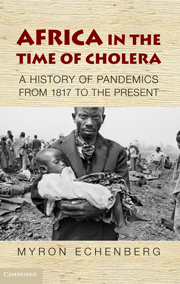Book contents
- Frontmatter
- Contents
- List of Figures, Maps, and Tables
- Acknowledgments
- List of Abbreviations
- Introduction
- PART ONE THE FIRST SIX PANDEMICS, 1817–1947
- 1 Cholera Circles the Globe
- 2 Medical Responses
- 3 Cholera Ravages Sub-Saharan Africa
- 4 Cholera in North Africa and the Nile Valley
- PART TWO THE SEVENTH PANDEMIC
- Bibliography
- Index
- Books in this series
2 - Medical Responses
Published online by Cambridge University Press: 05 June 2012
- Frontmatter
- Contents
- List of Figures, Maps, and Tables
- Acknowledgments
- List of Abbreviations
- Introduction
- PART ONE THE FIRST SIX PANDEMICS, 1817–1947
- 1 Cholera Circles the Globe
- 2 Medical Responses
- 3 Cholera Ravages Sub-Saharan Africa
- 4 Cholera in North Africa and the Nile Valley
- PART TWO THE SEVENTH PANDEMIC
- Bibliography
- Index
- Books in this series
Summary
The British took stock of cholera as the First Pandemic abated in India after 1821. They gradually reached conclusions they were to hold through most of the nineteenth century. First, they adopted what became known as anti-contagionism. It held that cholera was caused by peculiar aspects of the Indian environment such as the abrupt drops in temperature and the heavy rains of the monsoon, or by “miasmas” emanating from rotting vegetation or overcrowded dwellings. The death from cholera in 1827 of Sir Thomas Munro, governor of Madras, demonstrated that the disease could be alarmingly random, and that even the most powerful were susceptible. Still, Munro's misfortune excepted, cholera was a much greater danger to the Indian rural poor. The European and Indian elite enjoyed generally healthier living conditions, better diet, sanitation, and hygiene, and they were spared in large numbers for these reasons.
It also soon became fashionable – not only for the British, but in the West in general – to blame Indian squalor and superstition for cholera's persistence and spread. Foreigners came to identify the Hindu and Muslim pilgrimages, and British refusal to regulate these, as the prime culprits. As early as 1831, the French observer Moreau de Jonnès labeled troop movements and pilgrimages as the two major causes of cholera's spread in India, specifically alluding to the Puri pilgrimage in 1821.
- Type
- Chapter
- Information
- Africa in the Time of CholeraA History of Pandemics from 1817 to the Present, pp. 29 - 44Publisher: Cambridge University PressPrint publication year: 2011



